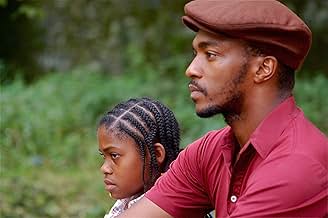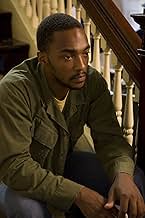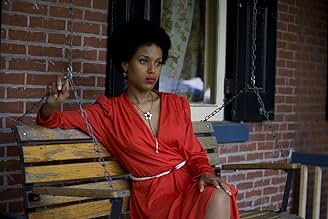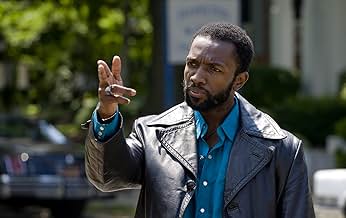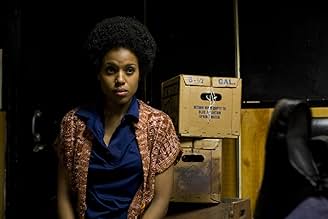IMDb रेटिंग
6.2/10
1.9 हज़ार
आपकी रेटिंग
अपनी भाषा में प्लॉट जोड़ेंIn 1976, complex political and emotional forces are set in motion when a young man returns to the race-torn Philadelphia neighborhood where he came of age during the Black Power movement.In 1976, complex political and emotional forces are set in motion when a young man returns to the race-torn Philadelphia neighborhood where he came of age during the Black Power movement.In 1976, complex political and emotional forces are set in motion when a young man returns to the race-torn Philadelphia neighborhood where he came of age during the Black Power movement.
- पुरस्कार
- 8 जीत और कुल 19 नामांकन
फ़ीचर्ड समीक्षाएं
NIGHT CATCHES US is a gripping film that reminds us of the importance of the Black Panther Movement. Historical distance and changes in this country may have numbed the memory of a social movement as an important racial equality step and the very words 'Black Panther' are unfortunately tainted with the radical ugly aspects. But Tanya Hamilton has written and directed this compelling movie NIGHT CATCHES US and hopefully the core meaning of the movement will gain respect in the minds of those fortunate to see this brilliant little film. In order to help those who are unfamiliar with this movement a brief history may help appreciate this film. 'The Black Panther Party (originally the Black Panther Party for Self- Defense) was an African-American revolutionary leftist organization. It was active in the United States from the mid-1960s into the 1970s. The Black Panther Party achieved national and international impact through their deep involvement in the Black Power movement and in US politics of the 1960s and 70s, as the intense anti-racism of the time is today considered one of the most significant social, political and cultural currents in US history. The group's "provocative rhetoric, militant posture, and cultural and political flourishes permanently altered the contours of American Identity. Founded in Oakland, California, by Bobby Seale and Huey P. Newton on October 15, 1966, the organization initially set forth a doctrine calling primarily for the protection of African American neighborhoods from police brutality. But the Black Panther Party's objectives and philosophy expanded and evolved rapidly during the party's existence. The organization's leaders passionately espoused socialist and communist (largely Maoist) doctrines, but the Party's black nationalist reputation attracted an ideologically diverse membership. Ideological consensus within the party was difficult to achieve, and some prominent members openly disagreed with the views of the leaders.'
The year is 1976 and Marcus Washington (Anthony Mackie, in a brilliant role) returns to Philadelphia after serving a jail term. He is without a job or place to stay and his father has just died, leaving the old family house to his brother who has sold it. Marcus sees his old friend Pattie -now Patricia - Wilson (Kerry Washington, likewise in a moving performance) who had been married to and had a child Iris (Jamara Griffin) by his best friend who was brutally murdered by the police in his own home. Marcus' arrival in the neighborhood (essentially unchanged from the height of the Black Panther days) and branded a 'Snitch' by his old friends: they believe Marcus informed the police of his friend's killing of a police officer and blame his friend's death on him. Patricia is now a lawyer and spends her days defending young black men and her time off supplying food and shelter to the parentless children of the neighborhood. Her nephew Jimmy (Amari Cheatom) has inherited the anger of the past and Patricia must frequently bail him out of jail for arrests for 'verbal abuse' of police officers. Though Patricia has a live-in lawyer boyfriend Carey Ford (Ron Simons) who helps her in her drive to better the lives of the neighborhood, once Patricia and Marcus rekindle their past friendship (and more), Carey moves out and Marcus moves in. Together Marcus and Patricia share the cause of the death of Iris' father with the bright young girl, an incident that draws the three of them closer. But old hates still exist and the bloody aspects of the Panther Movement appear to rekindle because of Marcus' presence. Marcus is approached by a black police captain Wendell Pierce (David Gordon) to infiltrate Marcus major enemy 'Do Right' Miller (Jamie Hector), but Marcus sees through the age old struggle between the neighborhood and the police, remembers the anguish of the past, and refuses to carry out the planting of evidence. After a scene of the Truth in the retelling of the history of Iris' father's murder - Patricia and Marcus finally face the past - and Marcus moves on.
To give more details of the story would distract from the power of the message. This is a movie that simply should be seen to put that period of time in perspective. The cast is particularly fine, not only Mackie and Washington, but also the young and very talented Amari Cheatom among others. One wonders why the sound track doesn't reflect the music from that period, instead using contemporary rap music, but that is a very small defect in an otherwise VERY fine film.
Grady Harp
The year is 1976 and Marcus Washington (Anthony Mackie, in a brilliant role) returns to Philadelphia after serving a jail term. He is without a job or place to stay and his father has just died, leaving the old family house to his brother who has sold it. Marcus sees his old friend Pattie -now Patricia - Wilson (Kerry Washington, likewise in a moving performance) who had been married to and had a child Iris (Jamara Griffin) by his best friend who was brutally murdered by the police in his own home. Marcus' arrival in the neighborhood (essentially unchanged from the height of the Black Panther days) and branded a 'Snitch' by his old friends: they believe Marcus informed the police of his friend's killing of a police officer and blame his friend's death on him. Patricia is now a lawyer and spends her days defending young black men and her time off supplying food and shelter to the parentless children of the neighborhood. Her nephew Jimmy (Amari Cheatom) has inherited the anger of the past and Patricia must frequently bail him out of jail for arrests for 'verbal abuse' of police officers. Though Patricia has a live-in lawyer boyfriend Carey Ford (Ron Simons) who helps her in her drive to better the lives of the neighborhood, once Patricia and Marcus rekindle their past friendship (and more), Carey moves out and Marcus moves in. Together Marcus and Patricia share the cause of the death of Iris' father with the bright young girl, an incident that draws the three of them closer. But old hates still exist and the bloody aspects of the Panther Movement appear to rekindle because of Marcus' presence. Marcus is approached by a black police captain Wendell Pierce (David Gordon) to infiltrate Marcus major enemy 'Do Right' Miller (Jamie Hector), but Marcus sees through the age old struggle between the neighborhood and the police, remembers the anguish of the past, and refuses to carry out the planting of evidence. After a scene of the Truth in the retelling of the history of Iris' father's murder - Patricia and Marcus finally face the past - and Marcus moves on.
To give more details of the story would distract from the power of the message. This is a movie that simply should be seen to put that period of time in perspective. The cast is particularly fine, not only Mackie and Washington, but also the young and very talented Amari Cheatom among others. One wonders why the sound track doesn't reflect the music from that period, instead using contemporary rap music, but that is a very small defect in an otherwise VERY fine film.
Grady Harp
Night Catches Us (2010)
A really fascinating look at an African-American reality in Philadelphia in 1976. The plot hook is more sensational than the movie itself—a former Black Panther returning home has to adjust to regular life and accusations of tattling. What really grips you, though, is the "regular life" part, because the acting and direction make this all feel honest and revealing. A slice of life done well.
If the core of the movie is how Blacks of different attitudes and philosophies learn to get along (and not get along) with each other, there is also the more expected acrimony between the Black community and the mostly White cops patrolling it. It's hard to know how accurate this part is, because here we are shown clichés of some very dumb and mean and hardheaded white cops, and maybe that was the norm. I'd like to think that some other movies have it right when there are those bad eggs on the force, but that many make an effort to get along and be reasonable with the people they are protecting.
But maybe one message of the movie taken whole is just how different it was back then, in the shadow of the truly radical and violent 1960s, as the Muslim influence was rising, as power was promising to shift more evenly between groups but was lurching too slowly. Maybe it was just filled with such distrust it led to caricatures for real. There are several segments of archival footage of Panthers and other protesting, and the gritty roughness of those scenes reveals some kind of glossing over of the situation for this fictional version made 35 years later.
The leading actor, Anthony Mackie, and leading actress, Kerry Washington, are both likable and excellent. You might say too likable and excellent—there is a modern feel to their demeanors that's hard to put your finger on. But they're both a joy to watch act and interact. The intentions are low key, and the result is easy going despite the tensions around them. It's a love story after all! Writer and director Tanya Hamilton is making her first feature film here, and she makes the most of her modest intentions.
As a commentary on race relations it is nearly the opposite of Spike Lee's approaches in their highly produced flair. And whatever the limitations of the film and its script, it has the net gain of a feeling of sincerity. Which goes a long way.
A really fascinating look at an African-American reality in Philadelphia in 1976. The plot hook is more sensational than the movie itself—a former Black Panther returning home has to adjust to regular life and accusations of tattling. What really grips you, though, is the "regular life" part, because the acting and direction make this all feel honest and revealing. A slice of life done well.
If the core of the movie is how Blacks of different attitudes and philosophies learn to get along (and not get along) with each other, there is also the more expected acrimony between the Black community and the mostly White cops patrolling it. It's hard to know how accurate this part is, because here we are shown clichés of some very dumb and mean and hardheaded white cops, and maybe that was the norm. I'd like to think that some other movies have it right when there are those bad eggs on the force, but that many make an effort to get along and be reasonable with the people they are protecting.
But maybe one message of the movie taken whole is just how different it was back then, in the shadow of the truly radical and violent 1960s, as the Muslim influence was rising, as power was promising to shift more evenly between groups but was lurching too slowly. Maybe it was just filled with such distrust it led to caricatures for real. There are several segments of archival footage of Panthers and other protesting, and the gritty roughness of those scenes reveals some kind of glossing over of the situation for this fictional version made 35 years later.
The leading actor, Anthony Mackie, and leading actress, Kerry Washington, are both likable and excellent. You might say too likable and excellent—there is a modern feel to their demeanors that's hard to put your finger on. But they're both a joy to watch act and interact. The intentions are low key, and the result is easy going despite the tensions around them. It's a love story after all! Writer and director Tanya Hamilton is making her first feature film here, and she makes the most of her modest intentions.
As a commentary on race relations it is nearly the opposite of Spike Lee's approaches in their highly produced flair. And whatever the limitations of the film and its script, it has the net gain of a feeling of sincerity. Which goes a long way.
Watching this film was a deeply moving experience for me. So many times we think we know something about a certain period in history and time, but we don't have a real grasp of the impact the events had on real people, how deep it cut, and how people had to struggle to survive.
In 1976 Philly the remnants of Black Panther movement is transforming itself, and we get to watch how different people choose their directions in life. It was eye-opening to understand how these choices will play out in today's Philly, today's America, 35 years later. The tragic events of the early 70's are bleeding into the love triangle that evolves, and the pain is palpable, thanks to beautiful, thoughtful performances by Kerry Washington, Anthony Mackie and an overall very strong cast.
The director's approach to film-making is essentially European in storytelling style, she employs different visual media modes from documentary to animation without a cheesy effect, and the main characters are complex and believable.
The movie is easy to watch, you root for the people you meet in it, and it allows you to explore simple, yet important questions - how would you act under pressure, who would you choose above all, what sacrifices you would make in life and how do you live with the aftermath of your decisions. Leaving a movie theater and still pondering over these questions a few days later - now, that's a rare occurrence these days.
In 1976 Philly the remnants of Black Panther movement is transforming itself, and we get to watch how different people choose their directions in life. It was eye-opening to understand how these choices will play out in today's Philly, today's America, 35 years later. The tragic events of the early 70's are bleeding into the love triangle that evolves, and the pain is palpable, thanks to beautiful, thoughtful performances by Kerry Washington, Anthony Mackie and an overall very strong cast.
The director's approach to film-making is essentially European in storytelling style, she employs different visual media modes from documentary to animation without a cheesy effect, and the main characters are complex and believable.
The movie is easy to watch, you root for the people you meet in it, and it allows you to explore simple, yet important questions - how would you act under pressure, who would you choose above all, what sacrifices you would make in life and how do you live with the aftermath of your decisions. Leaving a movie theater and still pondering over these questions a few days later - now, that's a rare occurrence these days.
"Night Catches Us" is the best art-house film I've seen in several months. In fact it bests a lot of the current main-screen fare. It deserves better than the quiet and uneven release it seems destined for.
I saw it back-to-back with the Oscar contender "The King's Speech". It balanced the double bill reasonably well. Although "The King's Speech" is of course superior, the comparison wasn't simply ridiculous.
I saw it twice ...which I often do with films I really like, as I tend to miss too many things the first time.
It's not moralistic. Both sides of survival vs. justice, violence vs. pacifism, united front vs. paranoia, victims vs. victimizers, and this generation vs. the next generation are portrayed sympathetically. Although at first glance one particular style of being seems to be being touted over the others, just a little reflection reveals that the film actually revels in moral ambiguity. Some characters manage to stay on the good side of the respectability line at all times, even while their inner demons are picked up and expressed -sometimes in socially unacceptable ways- by others around them. The camera notices more latent contradictions than the story ever delves into. For example the reverend was apparently beloved by the neighborhood, yet also lived in by far the finest house in the whole area.
The film isn't a polemic and doesn't seem to consciously attempt to portray cops in a bad light. Yet it doesn't shy away from sketches of substantial police bad attitude and violence.
"Night Catches Us" makes liberal use of art-house stylistic conventions. For example the confused, tangled, and partially submerged thoughts of a character are portrayed not by talking about them or even by seeing them in action, but by long leisurely shots from underneath of the crossed branches of overgrown vegetation. For another example, a character's longing for stability and tranquility is portrayed by lengthy shots of the proverbial babbling brook.
I wasn't irritated by the pacing. The film is by no means an action flick or a taut thriller, but I didn't find it like watching paint dry either. I tend to like slower paced films anyway (which of course doesn't mean everybody else will too:-). The most similarly paced movie that comes to mind is Clint Eastood's recent "Hereafter"; if you thought that was impossibly slow you'll probably have the same reaction to "Night Catches Us", but if that character exposition and portrayal of small events grabbed you this likely will too.
All the action takes place over just a few days in 1976. A block of important events that happened about a decade earlier is described mainly through bits of dialog. There are no visual flashbacks nor dream sequences (except of course for the occasional interspersed archival Black Panthers footage).
I found the acting quite good. It doesn't bowl you over as the greatest thing you've seen in years; but it's by no means "just workmanlike". Quite often meaning is communicated not by dialog but by subtle body language or facial expressions, which the actors seem fully up to. Both the individual characters and the chemistry between the characters are believably convincing.
I found the situation (or plot if you prefer to think of it that way) simple and complex at the same time. It's simple in that once you finally grasp it you can describe the whole thing in one short paragraph, and in that if you're one of those people who instantly "get" most movie clues you might be able to divine the whole thing well in advance. On the other hand it's complex in that it's revealed only one tiny bit at a time -sometimes in dialog and sometimes visually- so the whole movie can become a "mystery" to be solved if that's your preference.
I saw it back-to-back with the Oscar contender "The King's Speech". It balanced the double bill reasonably well. Although "The King's Speech" is of course superior, the comparison wasn't simply ridiculous.
I saw it twice ...which I often do with films I really like, as I tend to miss too many things the first time.
It's not moralistic. Both sides of survival vs. justice, violence vs. pacifism, united front vs. paranoia, victims vs. victimizers, and this generation vs. the next generation are portrayed sympathetically. Although at first glance one particular style of being seems to be being touted over the others, just a little reflection reveals that the film actually revels in moral ambiguity. Some characters manage to stay on the good side of the respectability line at all times, even while their inner demons are picked up and expressed -sometimes in socially unacceptable ways- by others around them. The camera notices more latent contradictions than the story ever delves into. For example the reverend was apparently beloved by the neighborhood, yet also lived in by far the finest house in the whole area.
The film isn't a polemic and doesn't seem to consciously attempt to portray cops in a bad light. Yet it doesn't shy away from sketches of substantial police bad attitude and violence.
"Night Catches Us" makes liberal use of art-house stylistic conventions. For example the confused, tangled, and partially submerged thoughts of a character are portrayed not by talking about them or even by seeing them in action, but by long leisurely shots from underneath of the crossed branches of overgrown vegetation. For another example, a character's longing for stability and tranquility is portrayed by lengthy shots of the proverbial babbling brook.
I wasn't irritated by the pacing. The film is by no means an action flick or a taut thriller, but I didn't find it like watching paint dry either. I tend to like slower paced films anyway (which of course doesn't mean everybody else will too:-). The most similarly paced movie that comes to mind is Clint Eastood's recent "Hereafter"; if you thought that was impossibly slow you'll probably have the same reaction to "Night Catches Us", but if that character exposition and portrayal of small events grabbed you this likely will too.
All the action takes place over just a few days in 1976. A block of important events that happened about a decade earlier is described mainly through bits of dialog. There are no visual flashbacks nor dream sequences (except of course for the occasional interspersed archival Black Panthers footage).
I found the acting quite good. It doesn't bowl you over as the greatest thing you've seen in years; but it's by no means "just workmanlike". Quite often meaning is communicated not by dialog but by subtle body language or facial expressions, which the actors seem fully up to. Both the individual characters and the chemistry between the characters are believably convincing.
I found the situation (or plot if you prefer to think of it that way) simple and complex at the same time. It's simple in that once you finally grasp it you can describe the whole thing in one short paragraph, and in that if you're one of those people who instantly "get" most movie clues you might be able to divine the whole thing well in advance. On the other hand it's complex in that it's revealed only one tiny bit at a time -sometimes in dialog and sometimes visually- so the whole movie can become a "mystery" to be solved if that's your preference.
I'd encourage anyone interested in watching good acting and film-making to watch "Night Catches Us".
The movie is set in 1976, in Philadelphia, and it is not "Rocky's" S. Philadelphia. The main characters have all had experience/involvement in the Black Panther movement, and the movie cuts a path through the complex feelings and realities that have evolved since they were once involved with it.
It's one of those films that revolves around a core group of characters who've all turned into somewhat different people from when they first knew each other. The dynamic is even more intense because each of the main characters has a tie-in to someone who was obviously a leader or loved one -- indeed it was his death years earlier that led the group to disperse.
I'm kinda bummed that awards seasons might be passing by this gem. Kerry Washington is great, but it's Anthony Mackie's film; he has an intensity and dignity. No overwrought acting.
The movie is set in 1976, in Philadelphia, and it is not "Rocky's" S. Philadelphia. The main characters have all had experience/involvement in the Black Panther movement, and the movie cuts a path through the complex feelings and realities that have evolved since they were once involved with it.
It's one of those films that revolves around a core group of characters who've all turned into somewhat different people from when they first knew each other. The dynamic is even more intense because each of the main characters has a tie-in to someone who was obviously a leader or loved one -- indeed it was his death years earlier that led the group to disperse.
I'm kinda bummed that awards seasons might be passing by this gem. Kerry Washington is great, but it's Anthony Mackie's film; he has an intensity and dignity. No overwrought acting.
क्या आपको पता है
- ट्रिवियाThis movie reunites Anthony Mackie and Kerry Washington who previously starred together in Spike Lee's 2004 film 'She Hate Me.'
- गूफ़The film is supposed to take place in 1975, but the blue Chevy Caprice police car is a 1986-1990 model.
- कनेक्शनReferenced in IMDb's 20th Anniversary Star of the Day: Anthony Mackie (2010)
टॉप पसंद
रेटिंग देने के लिए साइन-इन करें और वैयक्तिकृत सुझावों के लिए वॉचलिस्ट करें
- How long is Night Catches Us?Alexa द्वारा संचालित
विवरण
- रिलीज़ की तारीख़
- कंट्री ऑफ़ ओरिजिन
- आधिकारिक साइटें
- भाषा
- इस रूप में भी जाना जाता है
- Stringbean and Marcus
- फ़िल्माने की जगहें
- उत्पादन कंपनियां
- IMDbPro पर और कंपनी क्रेडिट देखें
बॉक्स ऑफ़िस
- US और कनाडा में सकल
- $76,185
- US और कनाडा में पहले सप्ताह में कुल कमाई
- $13,562
- 5 दिस॰ 2010
- दुनिया भर में सकल
- $76,185
- चलने की अवधि1 घंटा 30 मिनट
- रंग
- ध्वनि मिश्रण
इस पेज में योगदान दें
किसी बदलाव का सुझाव दें या अनुपलब्ध कॉन्टेंट जोड़ें



